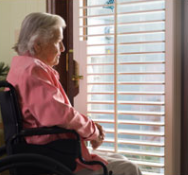Compliments of :
Body: Covid-19 and Post Traumatic Stress Disorder (PTSD)
Spirit: Happiness
Covid-19 and the Cost of Social Isolation

Betty is 97.
Lives in an Assisted Living Facility.
Must receive and take all her meals alone in her room.
Has not participated in any group social activities for approaching 3 months now.
Has had no physical contact with family, friends, or co-residents for almost 3 months.
Everyday is the same in the small room and times and dates have lost any distinction.
TV no longer serves as a distraction.
Betty admits to profound loneliness.
She is protected from the Covid-19 virus.
But is she safe?
No one will deny the need to do all we can to keep our communities safe and healthy during the Covid-19 pandemic. This is especially true for our most vulnerable citizens.
And yet, it would be equally wrong to deny the short-term and long-term impact of the loss of association, community, physical contact and touch.
We know that social engagement and connection form a critical part of our life experience. This is especially true as move through later-life transitions. Our time with family, friends, peers, and community contributes to our sense of well-being, life meaning, joy, and purpose.
Social isolation can increase feelings of loneliness, impairing our mental and physical health. Spiritual bonds are often challenged and questioned during lonely times. This is especially difficult for those isolated and living on their own – at home or in a care facility.
Loneliness has been linked to heart disease, high blood pressure, elevated inflammation, anxiety and depression. These risk factors contribute toward chronic illness, and ultimately, can lead to premature death.
Part of the problem with the loneliness resulting from the Covid-19 isolation is the uncertainty. How long will this go on, and when can we once again connect, assemble and even embrace? For those who are in the high-risk category, will they even see a time when their world will open up, and if so, what will that look like?
We may not be included in the high-risk category, but we most likely know people who are. We can start with understanding and awareness, and move toward support and acts of loving kindness.
Tips for Dealing with Social Isolation:
• Keep regular and frequent contact with those who are isolated.
• An unexpected card in the mail is always a special treat.
• To help create predictability, commit to a regular schedule of calls or ‘window contacts’ so your friends and loved ones have something to look forward to.
• If you commit to a call or window contact – KEEP IT!
• Window contacts or outside distancing present great opportunities to share pictures and videos. Bring some peanuts to feed the squirrels or seed to attract some birds.
• Whenever possible, keep regular celebrations such as birthdays shared with phone, Zoom, Skype, Facetime, WhatsApp type of connections.
• Book a time for all family members and friends to enjoy a TV show, movie, YouTube video, Podcast or TedTalk at the same time together. Keep the phone call active so you can share comments and laughter together.
• Make a point to share at least one ‘gift’ you have discovered through this isolated time.
• Call with some jokes ready, and some special memories to revisit together.
• Book a sing-a-long with your favourite songs and/or join a virtual choir.
• Encourage daily physical activity – even if it is simply moving arms and legs in a wheelchair.
• Acknowledge their uncertainty or fear or sadness.
• Express your appreciation and love for having their presence in your life. Let them know they still make a difference!
• Make a commitment to do it all over again.
Remember, it doesn’t take a village just to raise a child. It takes a village to navigate the mysterious and magical journey of life. Let’s cherish the honour and stewardship of our village membership.
Rhonda Latreille, MBA, CPCA
Founder & CEO
Age-Friendly Business
Covid-19 and Post Traumatic Stress Disorder (PTSD)
Up to 2 or 3 times more reports of PTSD are documented after extended periods of quarantines. Maintaining connections through social networks help with the most at-risk populations, including healthcare and other essential workers. It is important to reach out to social support networks during the quarantine and to continue these connections once the quarantine is lifted.
Happiness
“Happiness is in your ability to love others.”
Leo Tolstoy